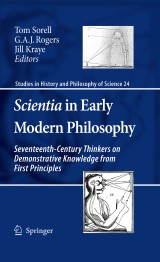Details

Scientia in Early Modern Philosophy
Seventeenth-Century Thinkers on Demonstrative Knowledge from First PrinciplesStudies in History and Philosophy of Science, Band 24
|
96,29 € |
|
| Verlag: | Springer |
| Format: | |
| Veröffentl.: | 28.10.2009 |
| ISBN/EAN: | 9789048130771 |
| Sprache: | englisch |
| Anzahl Seiten: | 139 |
Dieses eBook enthält ein Wasserzeichen.
Beschreibungen
<P>Scientia is the term that early modern philosophers applied to a certain kind of demonstrative knowledge, the kind whose starting points were appropriate first principles. In pre-modern philosophy, too, scientia was the name for demonstrative knowledge from first principles. But pre-modern and early modern conceptions differ systematically from one another. This book offers a variety of glimpses of this difference by exploring the works of individual philosophers as well as philosophical movements and groupings of the period. Some of the figures are transitional, falling neatly on neither side of the allegiances usually marked by the scholastic/modern distinction. Among the philosophers whose views on scientia are surveyed are Hobbes, Descartes, Spinoza, Gassendi, Locke, and Jungius. The contributors are among the best-known and most influential historians of early modern philosophy.</P>
<P>Scientia is the term that early modern philosophers applied to a certain kind of demonstrative knowledge, the kind whose starting points were appropriate first principles. In pre-modern philosophy, too, scientia was the name for demonstrative knowledge from first principles. But pre-modern and early modern conceptions differ systematically from one another. This book offers a variety of glimpses of this difference by exploring the works of individual philosophers as well as philosophical movements and groupings of the period. Some of the figures are transitional, falling neatly on neither side of the allegiances usually marked by the scholastic/modern distinction. Among the philosophers whose views on scientia are surveyed are Hobbes, Descartes, Spinoza, Gassendi, Locke, and Jungius. The contributors are among the best-known and most influential historians of early modern philosophy.</P>
Introduction, Tom Sorell University of Birmingham
Philosophia, Historia, Mathematica: Shifting Sands in the Disciplinary Geography of the Seventeenth Century, Daniel Garber Princeton University
The Unity of Natural Philosophy and the End of Scientia, Stephen Gaukroger, University of Sydney
Matter, Mortality and the Changing Ideal of Science, Catherine Wilson University of Aberdeen
Scientia and Inductio scientifica in the Logica Hamburgensis of Joachim Jungius, Stephen Clucas Birkbeck University of London
Scientia and the Sciences in Descartes, Tom Sorell University of Birmingham
Scientia and Self-Knowledge in Descartes, Nicholas Jolley University of California, Irvine
Spinoza’s Theory of Scientia Intuitiva, Don Garrett NYU
Scientia in Hobbes, Douglas Jesseph University of South Florida
John Locke and the Limits of scientia, G.A.J. Rogers Keele University
Philosophia, Historia, Mathematica: Shifting Sands in the Disciplinary Geography of the Seventeenth Century, Daniel Garber Princeton University
The Unity of Natural Philosophy and the End of Scientia, Stephen Gaukroger, University of Sydney
Matter, Mortality and the Changing Ideal of Science, Catherine Wilson University of Aberdeen
Scientia and Inductio scientifica in the Logica Hamburgensis of Joachim Jungius, Stephen Clucas Birkbeck University of London
Scientia and the Sciences in Descartes, Tom Sorell University of Birmingham
Scientia and Self-Knowledge in Descartes, Nicholas Jolley University of California, Irvine
Spinoza’s Theory of Scientia Intuitiva, Don Garrett NYU
Scientia in Hobbes, Douglas Jesseph University of South Florida
John Locke and the Limits of scientia, G.A.J. Rogers Keele University
<P>Scientia is the term that early modern philosophers applied to a certain kind of demonstrative knowledge, the kind whose starting points were appropriate first principles. In pre-modern philosophy, too, scientia was the name for demonstrative knowledge from first principles. But pre-modern and early modern conceptions differ systematically from one another. This book offers a variety of glimpses of this difference by exploring the works of individual philosophers as well as philosophical movements and groupings of the period. Some of the figures are transitional, falling neatly on neither side of the allegiances usually marked by the scholastic/modern distinction. Among the philosophers whose views on scientia are surveyed are Hobbes, Descartes, Spinoza, Gassendi, Locke, and Jungius. The contributors are among the best-known and most influential historians of early modern philosophy.</P>
<p>Accessible study of the early modern philosophers dispute on Scientia</p><p>Philosophers surveyed : Spinoza, Hobbes, Descartes, Gassendi, Locke and Jungius</p><p>Through top contributors a must-read for everybody interested in early modern knowledge theory</p>

















